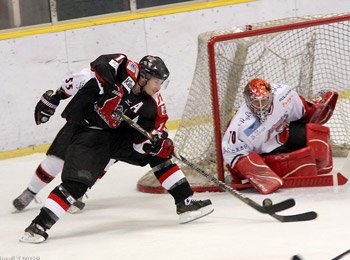Israel knocked off tournament favourites China and New Zealand, won four out of five games and captured the gold medal at the International Ice Hockey Federation’s (IIHF) Division II B tournament in Izmit, Turkey recently. With the win, Israel is promoted into Division II A next year.
Israel entered the tournament after a disappointing result last year, in which they finished fifth. But led by the top line of Oren Eizenman, Daniel Erlich and Max Birbraer, the Israelis cruised to the gold medal.
They secured top spot even before closing out the competition with a loss to Mexico. Israel finished ahead of Bulgaria, Mexico, New Zealand, China and Turkey.
“That’s the best club we’ve have,” said head coach Jean Perron. “I’m not talking about talent. I’m talking about team discipline, hard work and the way the guys played together, the chemistry. It was very good.”
Perron, who coached the Montreal Canadiens to a Stanley Cup win in 1986, has served as coach of the Israelis for several years, leading them to a gold medal in 2005.
Over the years, the success of the Israeli national team depended on which top players were available at the time. Going into Turkey, IIHF observers saw the team as an unknown entity. But with Erlich, who played for the University of Western Ontario after seasons with the Barrie Colts and London Knights of the OHL, Eizenman, who has played in the AHL and the ECHL and Birbraer, a New Jersey draftee who played in the British elite league, the team was poised to surprise.
“We started the tournament by upsetting the good clubs, China and New Zealand,” Perron said on the phone from Quebec. “That gives you confidence.”
“From then on we had good goaltending and a good environment for the guys too.”
Perron said the Israelis took hold of the tournament by excelling on the power play. In five games the Israelis scored 19 goals in 42 man-advantage situations, for a stunning success rate of 45.24 per cent.
“They tried to run us, we stayed disciplined and capitalized on the power play (pp),” Perron said.
Eizenman, who centred Erlich on right wing and Birbraer on left, said Perron changed their line for the power play. He and Birbraer played the points, while Erlich was joined by Sergei Frankel and Daniel Mazour up front. “There was a lot of puck movement… It was one of the biggest factors in winning,” Eizenman said.
“We drew a lot of penalties, just from our speed and creativity,” he added. “I think we were clearly the best team in the event, from goaltending to defense.”
Avishai Geller, who played forward on the team, recruited Erlich for the event. “In the last minute I decided to go and it turned out to be a great experience,” he said.
Perron “gave [the top line] lots of leeway to do what we wanted… We all played really high-level hockey and we knew what to do.”
While Israel continues to rely on North American-trained players, Perron believes the hockey talent being developed in Israel itself is getting better year by year. He singled out young defensemen Raanan Moscovich, Shai Maaravi and Evgeni Margoulis in particular. He credited assistant coach Dusan Kralik, a former Czech national junior player, for preparing the defense and getting the most out of the young players.
Israeli Avihu Sorotzky was named best goalie of the tournament. Erlich and Eizenman were first and second in scoring, with Erlich notching 7 goals and 16 assists for 23 points while Eizenman got 8 goals and 10 assists for 18 points. Erlich scored 11 points in a 13-2 rout of Bulgaria.
Though Israel and Turkey are experiencing somewhat chilly relations, that did not manifest itself in the tournament. Everything was run in a first class manner, Perron and Eizenman said.
Only one minor incident occurred. As the Israeli national anthem was being played after the victory over China, some fans began heckling. Arena personnel escorted the fans out of the venue and afterwards, officials of the Turkish hockey federation personally apologized for the slight, Perron said.
